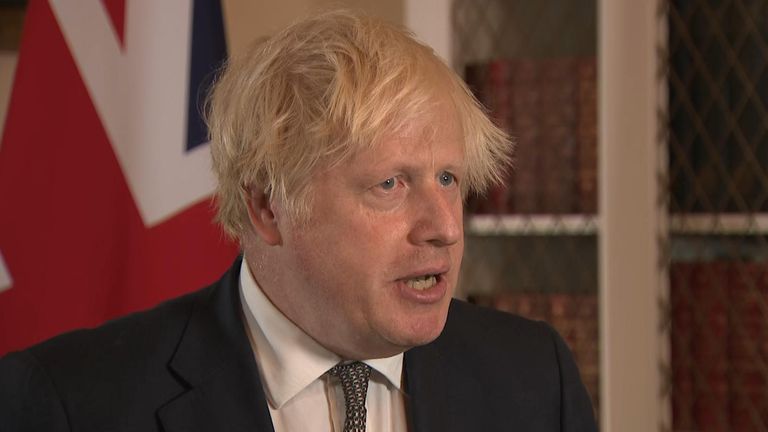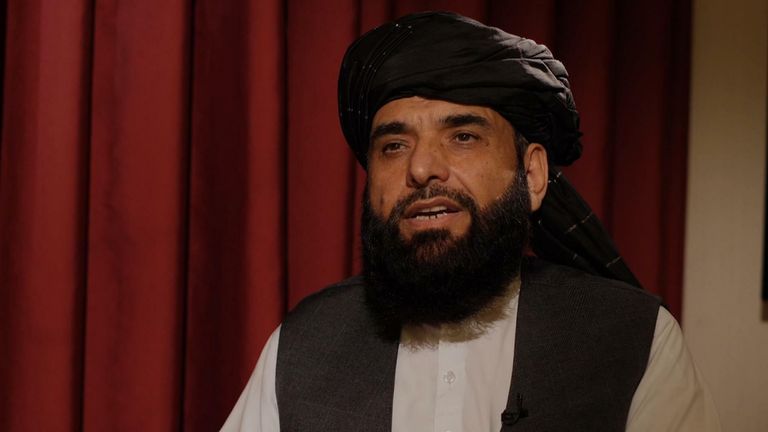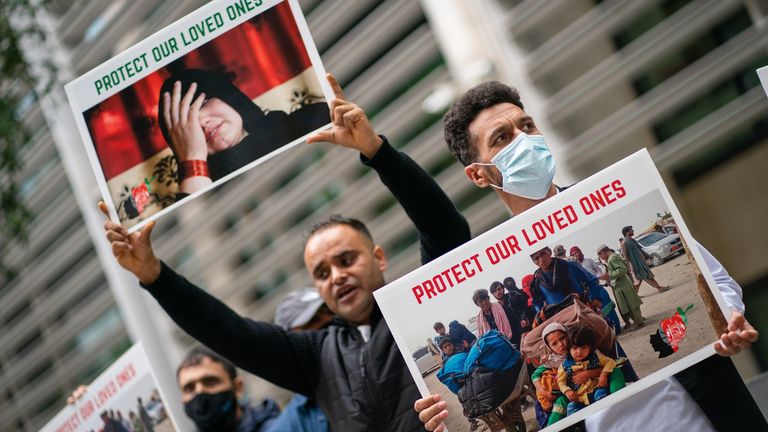Britain is actively working to keep an airport open in Afghanistan after the final withdrawal of troops, Sky News understands.
Prime Minister Boris Johnson said after Tuesday’s G7 summit that the number one priority for the West in coming months was to ensure safe passage for people who want to leave Afghanistan after 31 August when Western forces withdraw.
More specifics about this effort were revealed when the foreign secretary briefed MPs.
Dominic Raab told MPs that the government wants to see a functioning airport after the troops’ departure, appearing to suggest commercial flights might be able take people out of the country in future.
“If we want to do this in a more managed way and really take the steep angle off the cliff edge, what we really could do with is the Taliban being able to run a functional airport in Kabul,” he said.
He added that neighbouring countries could help uphold international aviation standards at the airport to keep it open.
“I’m sure there will be various neighbouring countries that will want to see if they can help them keep that airport open or indeed whether they want to get in members of the previous government, or the officials, to do that job.”
This would appear to be part of an attempt to ensure a more enlightened Taliban, rather than the return of what Mr Raab called “Taliban 1.0” – the type of regime that ran Afghanistan until 2001.
Mr Raab said: “We’ll use all levers we can to try and secure a transitional government whereby the Taliban takes in a broader range of Afghan political figures and leaders, and then also try make sure they can live up to better standards of human rights and wider government standards than what we saw with – if I can put it that way – Taliban 1.0.”
The British government is also looking with allies to create land routes within Afghanistan to help people reach neighbouring countries from where they can fly to the UK, something the Taliban is already making clear it opposes.
Mr Raab said: “I think the important ask of (the Taliban) now, in the same way as I mentioned ‘do they really want humanitarian aid given the potential collapse?’ Are they going to keep this going? Are they going to continue to allow nationals, (people with the right to reside in Britain), special cases, to leave?
“And I think that when we think of the range of levers that we’ve got, we can use these levers to say to the Taliban, we expect – and they are already committing to allow a safe passage out.”
Western countries believe they have strong economic leverage in the coming months.
Mr Raab said they believe that the Taliban’s single biggest priority is to avoid economic collapse after Western powers leave the country. This might give the West some influence in Afghanistan, as it means the Taliban could be seeking access to finance, access to development spending and fear the impact of sanctions.
“We will use every lever at our disposal to achieve that, from access to the international finance system, to the conditions we set around being willing to provide ODA (development assistance) through to sanctions,” he said.
Mr Raab said they hoped to gain assistance from other key countries not in the G7 such as China, India and Pakistan.
However this remark acknowledges a coordinated response from the international community could prove challenging if countries like Russia and China seek advantage by deciding to deal bilaterally with the new Afghan government.
The ideal way of dealing with the Taliban government in future would mirror that used in the Balkans, Mr Raab said.
He said he wanted an “international contact group” which the Western powers could use to liaise with the new Taliban government, based on the model from the former Yugoslavia.
He said they are “likely to have more influence on (the) Taliban with a broader group of countries who can really try and moderate what is happening on (the) ground.”
Mr Raab told MPs that almost all “mono national Britons (Britons without dual nationality)” have been evacuated, but he refused to be drawn on the numbers who would be left behind.
He stressed that the last few days would make “all the difference” and insisted the UK was still working on routes out of the country using airports both inside and outside Afghanistan.
“We have probably now got through – not all – but the lion’s share – the vast majority of the documented UK mono-nationals.”
After British citizens have been evacuated, Mr Raab said the next priorities for the Afghan Relocations and Assistance Policy (ARAP) would be female human rights activists, female judges, members of the LBGT+ community and the children of British passport holders where the lack of documentation for children whose parents are eligible to go to the UK is keeping the whole family in country.
Mr Raab told the 100 MPs on the call that there had been 11,000 people evacuated from April to August.



